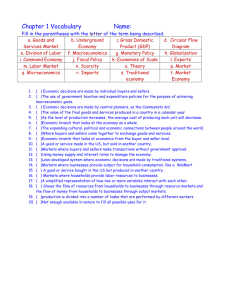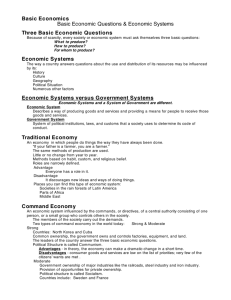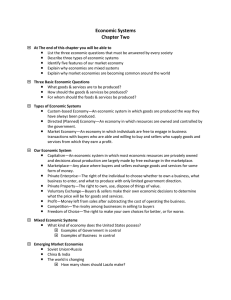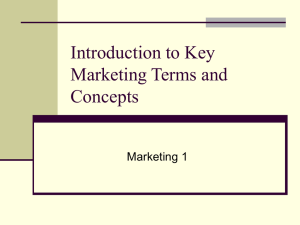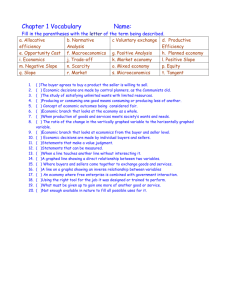Business Documents
advertisement
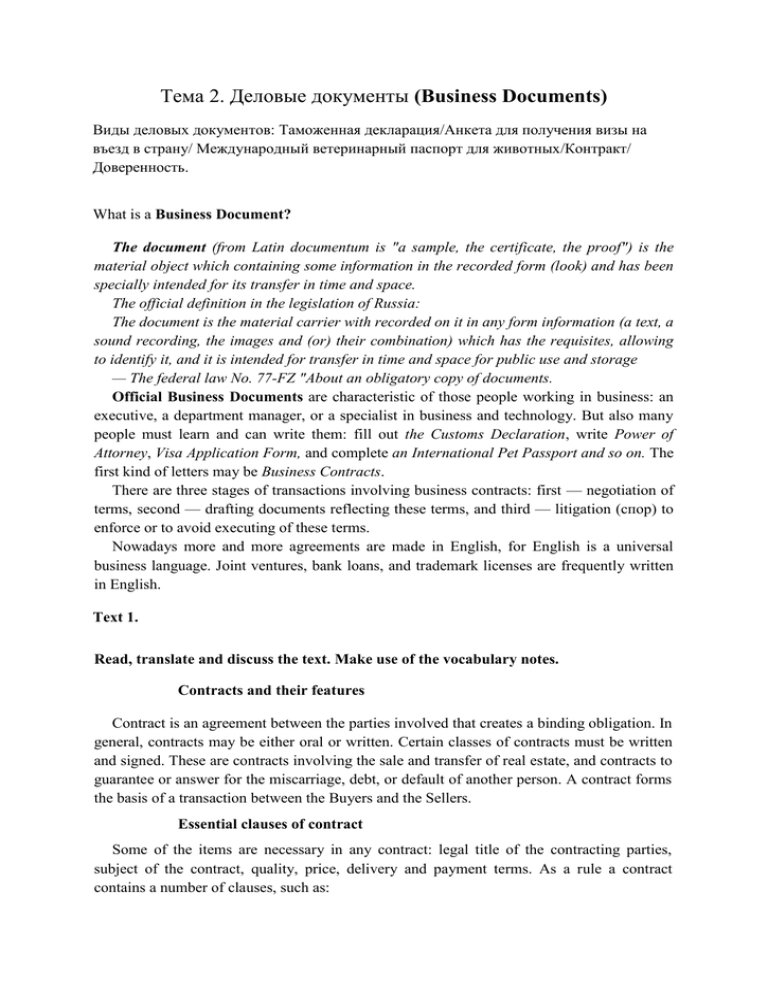
Тема 2. Деловые документы (Business Documents) Виды деловых документов: Таможенная декларация/Анкета для получения визы на въезд в страну/ Международный ветеринарный паспорт для животных/Контракт/ Доверенность. What is a Business Document? The document (from Latin documentum is "a sample, the certificate, the proof") is the material object which containing some information in the recorded form (look) and has been specially intended for its transfer in time and space. The official definition in the legislation of Russia: The document is the material carrier with recorded on it in any form information (a text, a sound recording, the images and (or) their combination) which has the requisites, allowing to identify it, and it is intended for transfer in time and space for public use and storage — The federal law No. 77-FZ "About an obligatory copy of documents. Official Business Documents are characteristic of those people working in business: an executive, a department manager, or a specialist in business and technology. But also many people must learn and can write them: fill out the Customs Declaration, write Power of Attorney, Visa Application Form, and complete an International Pet Passport and so on. The first kind of letters may be Business Contracts. There are three stages of transactions involving business contracts: first — negotiation of terms, second — drafting documents reflecting these terms, and third — litigation (спор) to enforce or to avoid executing of these terms. Nowadays more and more agreements are made in English, for English is a universal business language. Joint ventures, bank loans, and trademark licenses are frequently written in English. Text 1. Read, translate and discuss the text. Make use of the vocabulary notes. Contracts and their features Contract is an agreement between the parties involved that creates a binding obligation. In general, contracts may be either oral or written. Certain classes of contracts must be written and signed. These are contracts involving the sale and transfer of real estate, and contracts to guarantee or answer for the miscarriage, debt, or default of another person. A contract forms the basis of a transaction between the Buyers and the Sellers. Essential clauses of contract Some of the items are necessary in any contract: legal title of the contracting parties, subject of the contract, quality, price, delivery and payment terms. As a rule a contract contains a number of clauses, such as: Subject of the Contract. Quality and Price of goods. Terms of Payment. Delivery. Inspection and Test. Guarantee. Packing and Marking. Arbitration. Transport. Insurance and other conditions. Subject of contract This section names the product for sale or purchase. It also indicates the unit of measure generally employed in foreign trade for specific commodities. Contracts for bulk cargo contain a stipulation «about» or «plus or minus... per cent», denoting the permitted quantity tolerance. Quality and Price of goods The quality of machines and equipment is to be in conformity with the technical specification of the contract. The quality of raw materials and foodstuffs is determined, as a rule, by standards, by sample or by description. The price stated in a contract may be firm, fixed or sliding. Firm price. Firm prices are not subject to change in the course of the fulfillment of the contract. Fixed price. It is the price governing in the market on the day of delivery or for a given period. Sliding prices. These prices are quoted for machinery and equipment which require a long period of delivery. Arbitration In case of a breach of contract the injured party may go to court to sue for money damages, or for the contract to be rescinded, for injunction, or for specific performance if money damages would not compensate for the breach. Specific performance of a contract is the right by one contracting party to have the other contracting party perform the contract according to the precise terms agreed therein. Vocabulary essential clauses — существенные условия контракта strike a deal — заключить сделку legal title — юридическое наименование contracting parties — договаривающиеся стороны unit of measure — единица измерения commodity (goods) — товар tolerance — допустимое отклонение stipulation — условие bulk cargo — насыпной или наливной груз in conformity with — в соответствии с by sample — по образцу quote a price — назначать цену subject to — подлежащий firm prices — твердые цены fixed prices — фиксированные цены sliding prices — скользящие цены Ex.1. Answer the questions: 1. Why are standard contracts widely used? 2. What are the essential items of a contract? 3. What information is contained in different sections of a contract? 4. How is quality determined in the contract? 5. What sort of prices may be indicated in a contract? Text 2. Read, translate and discuss the text. Make use of the vocabulary notes. Terms of payment Payment in foreign trade may be made in cash and on credit. There are different methods of cash payment: 1. By cheque (but it is not practicable as a cheque is payable in the country of origin. That's why cheques are mostly used for payment in home trade.) 2. By telegraphic or telex transfers or post (mail) remittance which is made from the Buyers' bank account to the Sellers' in accordance with the Buyers' letter of instruction. Actually this method of cash payment may sometimes take several months, which is naturally very disadvantageous to the Sellers. The transfer is carried out at current rates of exchange. 3. By letter of credit (or just by credit) — L/C The following types of letters of credit are usually used: irrevocable, confirmed and revolving. - An irrevocable L/C is one which can neither be modified nor cancelled without the consent of the party in whose favour it has been opened. - A confirmed L/C is an irrevocable L/C, payment under which is guaranteed by a first class bank in case the opener of the L/C (i.e. the Buyers) or the bank effecting payment defaults, or is unable to make payment. - A revolving L/C is one under which its value is constantly made up to a given limit after payment for each shipment, which saves the charges on multiple letters of credit. The Letter of Credit is the most frequently used method of cash payment because it is advantageous and secure both to the Exporter and to the Importer though it is more expensive than payment by transfer. It overcomes the gap between Delivery and payment and gives protection to the Sellers by making the money available for them on the fulfilment of the transaction and to the Buyers because they know that payment will only be made against shipping documents giving them the title for the goods. This method от payment is often used in dealings with developing countries. 4. For collection (Payment for collection does not give any advantages to the Exporter because it does not give any guarantee that he will receive payment in time or at all. That's why the Exporter usually requires that the Importer presents a guarantee of a first class bank that payment will be effected in due time. Also, there is a long period of time between the delivery of the goods and actual payment. But it is advantageous to the Importer because there is no need to withdraw from circulation big sums of money before actually receiving the goods). Payment for collection against documents (with subsequent acceptance or very often telegraphic collection with subsequent acceptance) is mostly used in trade with East European countries. The costs involved in effecting payment for collection are twice or three times lower than those by letter of credit. Most modern business is done on a credit basis which may be: 1) by drafts (by Bills of Exchange — B/E) — the Exporter credits the Importer which is advantageous to the latter. A draft (a bill of exchange) is an order in writing from a Creditor to a Debtor to pay on demand or on a named date a certain sum of money to a company named on the Bill, or to their order. It is drawn by the Sellers on the Buyers and is sent through a bank to the Buyers for acceptance (i.e. for acknowledging the debt). The draft becomes legally binding when signed and dated by the Buyers on its face (front) and is to be met when due, i.e. 30, 60 or 90 days after presentation. The draft may be negotiable, i.e. it may be used by the Sellers to pay their own debts, but in this case the Sellers are to endorse it by signing it on its back, then they can pass it on to the new holders. If the exporter wants immediate payment, he can discount the draft in return for a cash advance with a bank for a commission, i.e. sell it to a bank for its face value less interest, and by supplying a document (a letter of hypothecation) giving the bank the legal right to claim the goods if necessary. Besides, he may leave it with a bank as security for a loan. All this makes the Draft a very practical method of payment in foreign trade. To sum up its advantages — it simplifies the financing of export and import foreign trade and cuts down innumerable movements of currency. There may be two main types of drafts: Sights Drafts, which are payable on presentation (at sight) or on acceptance and Term Drafts, which are drawn at various periods (terms) and are payable at a future date and not immediately they are accepted. Term drafts may pass through several hands before maturity and require endorsement by the Sellers. 2)in advance (the Importer credits the Exporter, for example, the contract may stipulate a 10 or 15 % advance payment, which is advantageous to the Sellers). This method is used when the Buyers are unknown to the Sellers or in the case of a single isolated transaction or as part of combination of methods in a large-scale (transaction) contract. 3)on an open account. Open account terms are usually granted by the Sellers to the regular Buyers' or customers in whom the Sellers have complete confidence, but sometimes they are granted when the Sellers want to attract new Buyers then they risk their money for that purpose. Actual payment is made monthly, quarterly or annually as agreed upon. This method is disadvantageous to the Exporter, but may be good to gain new markets. The two methods of payment (in cash and on credit) are very often combined in a contract. Drafts, for example, may be presented under a letter of credit and there may be other, sometimes very complicated combinations of various methods of payment stipulated in a contract. The currency to be used for payment is a matter for arrangement between the counterparts. Payment A cheque is a written order to a Bank given and signed by someone who has money deposited there to pay a certain amount mentioned in the cheque to a person named on it. In the place of the cheque system Banks provide an international system of Bank Transfers. The Seller gives TT or mail remittance terms to a Buyer when he is a trusted customer or agent. It involves risk as the Seller ships goods without any assurance of getting payment. Here is an example of a draft: Draft Moscow, _______ , 200___________ ON ____ PAY AGAINST THIS BILL OF EXCHANGE TO THE ORDER OF THE ALPHA BANK RUSSIA, MOSCOW, THE SUM OF__________ ONLY FOR VALUE RECEIVED. To. — Promstrojimport Like a cheque, a draft is an order to pay. It is made out by an exporter and presented to the importer. It is also called a bill of exchange. A sight draft is a bill which is paid immediately on presentation. A bill to be paid at a later date is called a term draft. There are 30-day, 60-, 90- and 120 day drafts. A very usefull method is to attach the shipping documents (the Bill of Lading, the Insurance Policy and the Invoice) to the Draft and hand them to the Bank for collection. The documents can be handed over to the Buyer either against payment (D.P. — Documents against Payment) or against acceptance of the Draft (D.A.-Documents against Acceptance). D.P. refers to sight drafts. D.A. refers to term drafts. A sight draft does not require acceptance. A term draft must be necessarily accepted. The drawee writes «Accepted» across it and signs his name. The draft is then returned to the Seller, who can hold it until maturity. This method of payment involves risk to the exporter or his bank as it may happen that a draft is not honoured when it is due. The shipper has full protection when drafts are presented against L/C. With a letter of credit, at least when it is confirmed and irrevocable, the payment is guaranteed. The Bank at the Sellers' end guarantees payment in case the opener of the credit defaults. Besides, the credit cannot be cancelled before the expiry date. Vocabulary cheque (англ.) check (амер.) — чек deposit — вносить деньги на хранение в банк telegraphic transfer (ТТ) — телеграфный перевод mail remittance — почтовый перевод customer — покупатель, клиент, заказчик bill of exchange/draft — вексель, тратта make out a document — составлять документ sight draft — тратта «на предъявителя» term draft — тратта с оплатой в конце обусловленного периода bill of lading — коносамент (подтверждение прием груза на борт) Text 3. Read, translate and discuss the text. Make use of the vocabulary notes. Transport and delivery terms Multimodal (Door to Door) transport is wide-spread in shipping now. It involves a transfer of goods from one mode of transport to another. Traditionally, the ship's rail was considered the critical point of responsibility, that is when all risks of loss or damage qre transferred from one party to the other. Now it is no longer the ship's rail but the port terminal which may be such a point. In sea port areas the goods are put into containers, on pallets or aboard the ship. The main carrier often prefers to assume through responsibility for the cargo he carries. In a through movement of the goods a combined transport document is issued instead of a traditional Bill of Lading. Like a traditional Bill of Lading it is a receipt for the consignment. But instead of ports of shipment and discharge it shows the place of delivery and receipt. Incoterms The new system of multimodal shipment in international trade is reflected in the International Commercial Terms (Incoterms 1980.). EX Works «Ex Works» means that the seller's only responsibility is to make the goods available at his premises (i.e. works or factory). In particular he is not responsible for loading the goods in the vehicle provided by the buyer, unless otherwise agreed. The buyer bears the full cost and risk involved in bringing the goods from there to the desired destination. This term thus represents the minimum obligation for the seller. Free Carrier ... (named point) This term has been designed to meet the requirements of modern transport, particularly such «multimodal» transport as container or «roll on-roll off» traffic by trailers and ferries. It is based on the same main principle as FOB except that the seller fulfils his obligations when he delivers the goods into the custody of the carrier at the named point. For/Fot FOR and FOT mean «Free on Rail» and «Free on Truck». These terms are synonymous since the word «Truck» relates to the railway wagons. They should only be used when the goods are to be carried by rail-: way. Fob Airport FOB Airport is based on the same main principle as the ordinary FOB term. The seller fulfils his obligations by delivering the goods to the air carrier at the airport of departure. The risk of loss of or damage to the goods is transferred from the seller to the buyer when the goods have been so delivered. FAS FAS means «Free Alongside Ship». Under this term the seller's obligations are fulfilled when the goods have been placed alongside the ship on the quay or in lighters. This means that the buyer has to bear all costs and risks of loss of or damage to the goods from that moment. FOB FOB means «Free on Board». The goods are placed on board the ship by the seller at a port of shipment named in the sales contract. The risk of loss of or damage to the goods is transferied from the seller to the buyer when the goods pass the ship's rail. C&F С & F means «Cost and Freight». The seller must pay the costs and freight necessary to bring the goods to the named destination, but the risk of loss of or damage to the goods is transferred from the seller to the buyer when the goods pass the ship's rail in the port of shipment. GIF CIF means «Cost, Insurance and Freight». This term is basically the same as С & F but with the addition that the seller has to procure marine insurance against the risk of loss of or damage to the goods during the carriage. The seller contracts with the insurer and pays the insurance premium. Freight Carriage Paid To Like C&F «Freight or Carriage paid to...» means that the seller pays the freight for the carriage of the goods to the named destination. However, the risk of loss of or damage to the goods, is transferred from the seller to the buyer when the goods have been delivered into the custody of the first carrier and not at the ship's rail. It can be used for all modes of transport including multimodal operations and container or roll on-roll off traffic by trailers and ferries. When the Seller has to furnish a bill of lading, waybill or. carrier's receipt, he duly fulfills this obligation by presenting such a document issued by the person with whom he has contracted for carriage to the named destination. Freight Carriage and Insurance Paid To... This term is the same as «Freight or Carriage Paid to...» but with the addition that the seller has to procure transport insurance against the risk of loss of or damage to the goods during the carriage. The seller contracts with the insurer and pays the insurance premium. EX Ship «ЕХ Ship» means that the seller shall make the goods available to the buyer on board the ship at the destination named in the sales contract. EX Quay «ЕХ Quay» means that the seller makes the goods available to the buyer on the quay (wharf) at the destination named in the sales contract. Delivered at Frontier «Delivered at Frontier» means that the seller's obligations are fulfilled when the goods have arrived at the frontier — but before «the customs border» of the country named in the sales contract. Delivered Duty Paid While the term «Ex Works» signifies the seller's minimum obligation, the term «Delivered Duty Paid», when followed by words naming the buyer's premises, denotes the other extreme — the seller's maximum obligation. The term «Delivered Duty Paid» may be used irrespective of the mode of transport. Примечание: «Incoterms» — «Международные правила толкования коммерческих терминов». Разработаны Международной Торговой Палатой, Сборник «Incoterms 1980» содержит правила толкования 14 базисных условий поставки EXW — EX works — франко-завод, с завода FRC — Free carrier... named point — свободно у перевозчика (в поименованном пункте) FOR/FOT — Free on Rail/Truck — франко-вагон, свободно в вагоне или на платформе FOA — FOB Airport — свободно в аэропорту FAS — Free alongside ship — свободно вдоль борта судна FOB — Free on Board — свободно на борту судна CFR — С and F — Cost and Freight — КАФ- стоимость и фрахт GIF — Cost, Insurance, Freight — СИФ-стоимость страхование, фрахт Freight/Carriage paid to — фрахт/провозная плата оплачены до... Freight/Carriage and Insurance paid to — фрахт/ провозная плата и страхование оплачены до... Ex Ship — с судна Ex Quay — с пристани DAF — Delivered at Frontier — поставлено на границе DDP — Delivered Duty Paid — поставлено с оплатой пошлины Vocabulary multimodal — мультимодальный mode of transport — вид транспорта ship's rail — рейлинг судна critical point of responsibility — критическая точка ответственности risk of loss or damage - риск утраты или повреждения товара terminal — грузовые склады в портах, имеющие сортировочные устройства pallet — поддон through — сквозной assume responsibility — взять на себя ответственность port of shipment — порт отгрузки port of discharge — порт разгрузки receipt — получение, расписка в получении vehicle — транспортное средство fulfil obligations — выполнять обязательства meet the requirements — удовлетворять требованиям, обеспечить потребности RO/RO Roll on/Roll off — метод транспортировки грузов с горизонтальной погрузкой и выгрузкой ferry — паром custody — хранение wagon — товарный вагон carrier — перевозчик carry — везти, перевозить carriage — перевозка, транспортировка by rail — по железной дороге quay (wharf) — причал lighter — лихтер on board a ship — на борту судна marine insurance — морское страхование insured — 1) страхователь (лицо, отдающее имущество на страхование); 2) застрахованный insurer — страховщик (лицо, принимающее имущество на страхование) insurance premium — страховая премия, страховой взнос Ex.1. Answer the questions: 1. What does the term «multimodal transport» mean? 2. What is regarded as the critical point now? 3. What document is issued in combined transport? 4. What mode of transport do you use for carriage of goods? 5. Where are critical points of responsibility under Incoterms? Text 4. Read, translate and discuss the text. Make use of the vocabulary notes. Packing and marking Goods for export are to be properly packed. If they are poorly packed and marked the carrier can refuse to accept them, or will make qualifications about the unsatisfactory condition of packing in the bill of lading. Packing can be external (crate (клеть), bag) and internal (box, packet, flask etc.), in which the goods are sold. In case of consumer goods packing has a double function. On the one hand, it is for protection. On the other — it serves to advertise a product and attract a customer. Marking should be in indelible paint with recognizable marks. Here is an extract from a concerning packing contract: Contract №. ____________ Packing 1. The equipment and spare parts are to be shipped in export packing meeting the requirements of each particular type of equipment. 2. The packing is to secure full safety of the goods from any kind of damage and corrosion during transportation by sea, railway and combined transport. The packing shall be suitable for loading by crane, by autocars, by trucks and manually in so far as the weight and volume of individual packages allow. Before packing, the equipment is to be protected with anticorrosive coating to protect it from any damage and corrosion in transit and to ensure storage during hot summer and cold winter. 3. The Sellers shall be responsible for any damage to or breakage of the goods that may be caused by poor packing or for corrosion which may appear due to improper or insufficient coating. Here is an extract from a contract concerning marking: Contract No. ______________ Marking 1. The cases in which the equipment is packed are to be marked on three sides: on the top of the case and two non-opposite sides. 2. The marking shall be clearly made with indelible paint in English and Russian as follows: Contract No. Контракт № Trans No. Транс № Package No. Место № Net/Gross weight in kg Вес нетто/брутто в кг Case dimensions in cm Размеры места в см (length, width, heigth) (длина, ширина, высота) 3. All cases which need special handling must have an additional marking as well as other indications if specific handling of a particular case is required: «Handle with саге» «Осторожно» «Тор» «Верх» «Do not turn over» «Не кантовать» «Do not use hooks» «Не использовать крюки» Vocabulary packing — упаковка external packing — внешняя упаковка internal — внутренняя упаковка sea packing — морская упаковка marking — маркировка marks — маркировочные знаки на упаковке make qualifications — делать оговорки indelible — несмываемый safety — сохранность in transit — в пути (о грузах) storage — хранение breakage — поломка Ex. 1. Answer the questions: 1. What are the packing requirements? 2. What preventive measures are necessary to protect the goods from damage? 3. Why is it necessary to know the freight routes when packing? 4. What are kinds of export packing? 5. What is the function of packing in the sale of consumer goods? 6. What are the requirements for marking the goods? 7. What is usually written on packing about special handling? 8. What can happen if marking is wrong? 9. What are the standards of packing and marking? Insurance of goods The export trade is subject to many risks. Ships may sink or collide; consignments may be lost or damaged. So, the goods are usually insured now for the full value. The idea of insurance is to obtain indemnity in case of damage or loss. Insurance is against risk. While the goods are in a warehouse, the insurance covers the risk of fire, burglary, etc. As soon as the goods are in transit they are insured against pilferage, damage by water, breakage or leakage. Other risks may also be covered. The insured is better protected if his goods are insured against all risks. The goods may be also covered against general and particular average. In the insurance business the word average means loss. Particular average refers to risks affecting only one shipper's consignment. General average refers to a loss incurred by one consignor but shared by all the other consignors who use the same vessel on the same voyage. Vocabulary consignment — груз, партия товара insurance indemnity — страховое возмещение warehouse — склад (товарный) burglary — кража со взломом pilferage — мелкая кража, хищение из отдельных мест груза leakage — утечка general average — общая авария particular average — частная авария incur losses — терпеть убытки consignor — грузоотправитель Ex. 1. Answer the following questions: 1. What are the risks to which the export trade is subject? 2. What does the word «average» mean in the insurance business? 3. What are the names of the biggest insurance companies in Russia? Ex. 2. Now to draw Russian copy of the present Contract, because it is drawn in English and Russian in 2 copies both being equally authentic. CONTRACT No _______ Moscow, ................... This Contract is made between JSC ..................... Russian Federation, Moscow, hereinafter referred to as "Sellers", on the one part, and _______________________________________________________________________ hereinafter referred to as "Buyers" on the other part (both Buyers and Sellers hereinafter referred to as Parties to the Contract), whereby the following is agreed: 1. Purpose and Scope of the Contract 1.1. Sellers have sold and Buyers have bought about_________________metric tons of Russian Export Blend Crude Oil (REBCO) hereinafter referred to as "Goods" FOB one safe port Baltic / Black Sea or through pipeline "Druzhba" DAF border pumping station Adamovo Zastava/ Feneshlitke/ Budkovitse. 1.2. For each month of delivery Buyers and Sellers shall agree on the volumes and terms of delivery to be effected during the month of delivery (as per Article 4 herein). 1.3. The quantity of Goods delivered under this Contract may be increased by mutual consent of the Parties, in such case an Amendment to the present Contract will be signed by the Parties. 2. Price and Value of the Contract 2.1. Price for the Goods sold under the present Contract is fixed in US dollars per net barrel as per Addendum No 2 to the present Contract. 2.2. Value of the Contract on the signature date is equal to_____________ US dollars. This is an estimated value of the Contract and is subject to change with the alterations of PLATT'S quotations. 3. Quality and Quantity of the Goods 3.1.The Goods to be supplied under the present Contract shall be standard quality Russian Export Blend Crude Oil as normally exported from the C.I.S. in conformity with the Specifications as per Addendum No 1 (Quality of Goods) which is an integral part of this Contract. 3.2.The quality and quantity of the Goods delivered under the present Contract shall be recorded: - in case of FOB delivery, quality as per Certificate of Quality issued by the laboratory at the port of loading, gross-Quantity as per Bill of Lading issued at the loading port, net Quantity in barrels as per Independent Inspector's report based on gross Quantity; Net-quantities in barrels as per Independent Inspector's report to be final and binding upon both Parties and will be used for invoicing purposes (save for fraud or manifest error); - in case of DAF border pumping station delivery, Quality of Goods as per DeliveryAcceptance Reports (DAR) issued at the point of transaction in accordance with the methods in force in the Sellers' country. Net-quantity in metric tons as per DAR to be converted into net- quantity in barrels using ASTM Tables and actual density of crude oil at 20°C and will be used for invoicing purposes. 4. Delivery and Acceptance 4.1. In case of FOB delivery: 4.1.1. Goods under this Contract are to be delivered in consignments of 50,000.00 MT minimum each in case of FOB deliveries. 4.1.2. Title and risks shall pass from the Sellers to the Buyers at the moment the Goods pass the tanker's permanent hose connection at the loading port. 4.1.3. Date of Bill of Lading is considered to be the date of delivery of the Goods. 4.1.4. Buyers will have the right to load the Goods with operational tolerance plus / minus 10% from nominated cargo of the Goods. 4.1.5. Sellers are to notify Buyers by fax or e-mail at least 5 days prior to the month of delivery of the expected quantities of the Goods to be delivered in such month (the Buyers will be advised of the final delivery program as per Transneft's Export schedule immediately after its approval) also notifying the Buyers of the following: - place of delivery (names of sea port terminals); - delivery program (timing and volumes, delivery program not to be inconsistent with FOB Terms of Delivery as per Addendum No 4). 4.1.6.Within 3 working days of receipt of the delivery program from Seller, Buyer is to confirm his readiness to receive the Goods according to such program. Further nominations of cargoes of the Goods to be as per Addendum No 4 4.1.7.During the loading of the tanker arbitration samples are to be taken from the end of the shore pipeline according to the standard procedure currently in force at the port of loading. 4.1.8.The samples, thus taken, and thoroughly mixed, are to be filled into bottles and sealed. One part of these samples, filled into not less than two bottles and sealed by Sellers, is to be placed on board the tanker, care of the Master, for delivery to Buyers or their nominated receiver at the port of discharge. 4.1.9.The other part of the same samples, filled into not less than two bottles and sealed by the Master, is to be kept by Sellers. 4.1.10.Both parties are to keep these samples for at least two months commencing from the date of delivery and in case of a claim until such time as the claim is settled. 4.1.11.Parties will nominate mutually acceptable and recognised Independent Inspector (Saybolt, _______etc.) to attend the loading, with costs to be equally shared between the Parties. 4.2. In case of DAF border pumping station delivery: 4.2.1.Title for the Goods and all risks shall pass from the Sellers to the Buyers at the moment of signing the Delivery - Acceptance Report at the point of delivery. 4.2.2.The date of the last Delivery-Acceptance Report for each monthly lot of the Goods will be considered the Date of Delivery for invoicing purposes. 4.2.3.Sellers are to notify Buyers by fax or e-mail at least 5 days prior to the beginning of the month of the delivery program for this month (The Buyers will be advised of the final delivery program as per Export schedule of TRANSNEFT immediately after its release) also informing Buyers of the following: - points of delivery (pumping stations of "Druzhna" pipeline) on C.I.S. border; - provisional volumes of delivery. 4.2.4.Within 3 working days of receipt of the delivery program from Sellers Buyers are to confirm their readiness to receive the Goods according to such program. 4.2.5.The Sellers shall contact the operator of the pipeline to ensure oil delivery to the Delivery- Acceptance Point. Sellers will advise Buyers, when possible, of the expected dates of Delivery- Acceptance Reports (DAR). 4.2.6. Buyers will arrange through their customers the confirmation to Sellers and to Transneft of the acceptability of the nominated parcel. 4.2.7. During the delivery by pipeline arbitration samples shall be taken as per the regulations at the Delivery-Acceptance Point. 5. Terms of Payment Terms of Payment are stipulated in Enclosure No 3 and this Addendum is an integral part of the present Contract. 6. Claims 6.1. If the Quality of the Goods determined at the loading port or at the pumping station (in case of delivery by pipeline) is not in conformity with the contractual specifications, the Quality of the arbitration samples will be checked by the mutually agreed Independent Laboratory, the charges to be shared 50/50 between the Parties. The results of the analysis are to be final and binding upon both Parties. 6.2. Claims for quality are to be made against the Sellers within 2 months from the Date of the Bill of Lading or one month after the last Delivery-Acceptance Report. Any claim received after this period will not be considered by Sellers and Buyers will have no right to refer it to Arbitration. 6.3. The claim if any made against the Sellers for a full or partial cargo lot does not give the Buyers the right to suspend loading or refuse to accept this quantity or any other quantities under the present Contract. The claim can be sent by the Buyers by fax, or registered letter. The date of the postage stamp or date of the fax is to be considered the date of submitting the claim. 7. Force Majeure 7.1. Should any circumstances arise which prevent complete or partial fulfilment by either Party of their respective obligations under this Contract (except non-payment under the provisions thereof), namely: fire, ice conditions or any other acts of elements, war, military operations of any character, blockade, strikes, prohibition of export or transit, impossibility of transit in the pipeline linking the Seller to the loading port or in the case of sales by pipeline, to the delivery point or from delivery point to the point of intended destination, or any other circumstances beyond the Parties' control which have arisen after the conclusion of the Contract, the time stipulated for the fulfilment of respective obligations shall be extended for the period equal to that during which the above mentioned circumstances remain in force. If the above mentioned circumstances continue to be in force for more than 20 days, any delivery or deliveries which are to be effected under the present Contract within this period can be suspended on the declaration of either Party. If the above mentioned circumstances last for more than 40 days each Party shall have the right to terminate any further fulfilment of their respective obligations under the Contract. 7.2. The Party for whom it becomes impossible to meet their respective obligations under the Contract shall: (a) immediately advise the other party of the beginning and the cessation of the circumstances which prevent fulfilment of their obligations, and (b) provide as soon as possible the other Party with the evidence of the Force Majeure (Certificates issued by the Chamber of Commerce of the Country where Force Majeure took place will be considered as sufficient proof of such circumstances and of their duration). 8. Governing Law and Arbitration 8.1. The Parties shall endeavour to resolve amicably all disputes or differences which may arise out of this Contract, or in connection with it. 8.2. If the Parties fail to achieve a mutually acceptable agreement, all disputes and claims arising in connection with the present Contract (including the Addenda) shall be settled by arbitration in accordance with the Rules of the Arbitration Institute of the Stockholm Chamber of Commerce. The site of arbitration shall be Stockholm, Sweden. Each party shall be entitled to submit to the Arbitrators their views in writing on the matter submitted, forwarding a copy to the other party, and make oral statements to arbitration but only in the presence of the other party. The award of this Arbitration Institute shall be final and binding upon the Parties concerned. The Parties undertake to keep the contents of the arbitration procedures strictly confidential. 8.3. The Parties agree that this Contract (including the Addenda) shall be governed by and be interpreted in all respects in accordance with Swedish Law and that this Arbitration Clause No 8 shall be considered having legal force irrespective of the validity of the Contract, integral part of which it is. The language to be used in the arbitration proceedings shall be English. 9. Other Terms 9.1. Neither Party is entitled to assign their obligations and rights under the present Contract to any third party without written (including fax message) consent of the other Party. 9.2. Any amendments and/or supplements to the present Contract should be valid only if they are made in writing and duly signed by both Parties. 9.3. All the Supplements and Addenda duly signed, are integral part of the present Contract. 9.4. All taxes, customs and other duties in connection with the conclusion and execution of the present Contract and levied on the Goods in the territory of the former Soviet Union shall be paid by the Sellers. All taxes, customs and other duties in connection with the conclusion and execution of the present Contract and levied on the Goods beyond the territory of the former Soviet Union shall be paid by the Buyers. Sellers will ensure timely acquisition of all appropriate export licences, if any and clearances of any character for the Goods being the subject of the present Contract. 9.5. Where not inconsistent with the above latest INCOTERMS 20___edition shall apply. 9.6. Neither Party of this Contract shall be liable for consequential indirect losses and damages of any kind arising out of or in any way connected with the conclusion, execution, failure to execute or cancellation of this Contract. 9.7. After signing the present Contract all previous negotiations and correspondence between the Parties in this connection will be considered null and void. The Contract comes into force as from the date of its signature and until December 31, 20 The present Contract is drawn in English and Russian in 2 copies both being equally authentic. 10. Legal Addresses of the Parties Sellers: JSC phone: (095) fax: (095): Bank of Seller: RUBLE acc: USD acc: transit USD acc via USD acc: INN (Identification Number of tax payer) Buyers: phone: fax: The Bank of Buyer phone: fax: USD account: via For SELLERS: Name ................ Position ........... For BUYERS: Name ................ Position ........... ************************** Ex. 3. Translate the text into English: Контракт — это документ, который обеспечивает юридические обязательства сторон и создает основу различного рода сделок. Контракты могут заключаться как между фирмами одной страны, так и между организациями разных стран. Как правило, любой международный контракт содержит ряд стандартных параграфов (статей), которые являются обязательными, а именно: юридические адреса сторон, предмет контракта, цена товара и общая стоимость, сроки поставки, качество товара, его упаковка и маркировка, транспортные условия, условия платежа, гарантии, форс-мажор, страхование, санкции и арбитраж. Каждая статья может включать несколько подразделов. Исполнение контрактов не всегда проходит гладко, и нередко приходится прибегать к помощи арбитра. В этих случаях очень важно, чтобы контракт был составлен ясно и недвусмысленно. Now let’s learn and complete the following Business Document - the Customs Declaration, Power of Attorney, Visa Application Form, an International Pet Passport (Примечание: бланк Таможенной декларации представлен отдельным файлом и находится в разделе «Основной учебный материал». Остальные находятся ниже в Приложение 1.)


